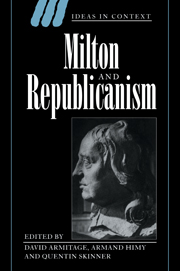Book contents
- Frontmatter
- Contents
- Notes on contributors
- Preface
- PART I DEFINING MILTON'S REPUBLICANISM
- PART II MILTON AND REPUBLICAN LITERARY STRATEGY
- PART III MILTON AND THE REPUBLICAN EXPERIENCE
- 8 Popular republicanism in the 1650s: John Streater's ‘heroick mechanicks’
- 9 Milton and Marchamont Nedham
- 10 Milton and the Protectorate in 1658
- 11 John Milton: poet against empire
- PART IV MILTON AND THE REPUBLICAN TRADITION
- Index
- Recent titles in the series include
8 - Popular republicanism in the 1650s: John Streater's ‘heroick mechanicks’
Published online by Cambridge University Press: 27 October 2009
- Frontmatter
- Contents
- Notes on contributors
- Preface
- PART I DEFINING MILTON'S REPUBLICANISM
- PART II MILTON AND REPUBLICAN LITERARY STRATEGY
- PART III MILTON AND THE REPUBLICAN EXPERIENCE
- 8 Popular republicanism in the 1650s: John Streater's ‘heroick mechanicks’
- 9 Milton and Marchamont Nedham
- 10 Milton and the Protectorate in 1658
- 11 John Milton: poet against empire
- PART IV MILTON AND THE REPUBLICAN TRADITION
- Index
- Recent titles in the series include
Summary
In the spring of 1662, the publisher, soldier and politician John Streater collected the blind poet, playwright and recently retired civil servant John Milton from his residence near the Strand and took him to a performance of his play Macbeth at the recently constructed public theatre next to Somerset House. Both men had cause to be grateful for the triumph and survival of the republic in the crisis of 1659–60, and their friendship had been forged during the anxious spring and summer months of 1660, when feverish negotiations and the deft deployment of the army had kept a threatened invasion of royalists at bay. Streater's military prowess (and his skill with artillery) had won him acclaim, and he was set to prosper as a publisher (the government had offered him much work). He had also recently been elected to the assembly of the people, one of the two chambers adopted by the constitutional legislation of November 1660. Milton had not been at all happy with this constitution at first (he had favoured a single perpetual chamber), but he had come to realize that a two-chamber constitution was the most effective means of reconciling all parties and interests to the continuing kingless state, as the constitution's chief author, James Harrington, had predicted. He contented himself with the dictation of a long poem on the triumph of the Puritan revolution, and he was refreshing his knowledge of educational and scientific advances made since the proclamation of a republic because these were to be given a book all of their own.
- Type
- Chapter
- Information
- Milton and Republicanism , pp. 137 - 155Publisher: Cambridge University PressPrint publication year: 1995
- 6
- Cited by



